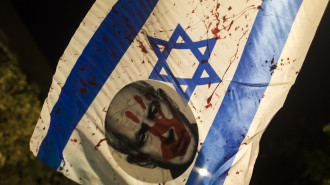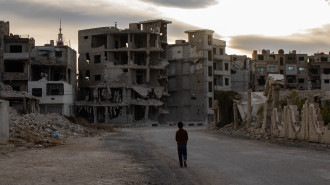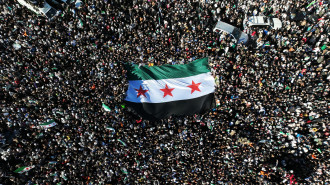Breadcrumb
Yemen in Focus: Could the Yemen conflict crack the Saudi-UAE alliance?
Cracks in the alliance began to surface after the UAE-backed southern separatists captured Aden and other neighbouring cities last week, prompting fierce backlash from Yemen’s government.
Yemen’s President Abedrabbo Mansour Hadi had himself called on Saudi authorities to take action after the UAE confirmed it had launched airstrikes in Aden and labelled soldiers from Yemen’s national army as “terrorist militias” amid heightened tensions between the allies.
The UAE’s foreign ministry statement late on Thursday confirmed that "precise and direct airstrikes" on Wednesday and Thursday hit militias in the interim capital Aden, where the UAE-backed separatists and Yemen’s government have been vying for power for several weeks.
The Abu Dhabi statement claimed the militias had planned to target a Saudi-led military coalition, of which the UAE is a key member, backing the Yemen government against Houthi rebels.
"The military operation against the terrorist militias was based on confirmed field intelligence that the militias prepared to target the coalition forces - a development which required a preemptive operation to avert any military threat," said the statement, carried by the Emirates' official WAM news agency.
The UAE accusation risks straining an already complex conflict in Yemen and has already triggered calls by Yemeni government officials, protesters in Taiz as well as Saudi Twitter users online to expel the Emiratis from the Saudi-led coalition involved in the Yemen conflict.
In response, Emirati media ramped up the tensions by accusing Yemen’s Riyadh-based president of being “kidnapped” in the kingdom where he is conducting what was described as a “hotel government”.
Rumours have long circulated surrounding the fate of Yemen’s president in Saudi Arabia, who many believe is under house arrest and forbidden from speaking without approval from the kingdom. This has led Yemen watchers to believe Hadi’s recent criticism of the UAE could echo the unsaid sentiments of its Saudi allies.
Saudi Arabia and the UAE have led a coalition of Arab states battling Houthi rebels in Yemen, but the allies have come face to face on the battlefield in the south of the country in recent weeks where UAE-backed separatists forces have clashed with Saudi-backed government forces to capture control.
Though both camps have clashed previously during the four-year conflict, the Saudis and Emiratis have maintained a unified front outside of Yemen’s borders.
Read more: Comment: How Yemen's southern separatists mirror their authoritarian Emirati backers
But Fatima Alasrar, a Non-Resident Scholar at the Middle East Institute told The New Arab that the alliance is not as solid as it seems.
“Both Saudis and Emiratis have divergent views in Yemen. The Saudis cannot see a fractured Yemen because it will leave them vulnerable to a Houthi state on their border, and the UAE cannot tolerate the Islah elements in the government, as well as AQAP, and will seek to eliminate both threats.
“If both countries perceive that there's a lack of cooperation on the security front, then there's reason to believe that the rift will deepen into yet another proxy for Yemen over the South,” Alasrar said.
Hadi slams UAE
The criticism came as deadly clashes saw an uptick in violence in Aden this week that left dozens dead in the temporary capital.
Hadi, who has been located in Riyadh since the early days of the conflict, slammed the UAE’s activities in the south of the country.
"We were shocked by the UAE's air raids against citizens and members of our national army amid populated neighbourhoods across the temporary capital Aden, which led forces to withdraw from the Aden province," the Yemeni presidency said in a statement on Thursday.
Hadi said he directed "the government of all its institutions to take all necessary measures at various levels to face this blatant targeting", against the country, as well as its “unity and territorial integrity."
Comment: How Yemen's southern separatists mirror their authoritarian Emirati backers
"We have not been intimidated by the weapons and arsenal of Iran and its militias, nor will we be intimidated by fighter jets targeted on our land," the Yemeni president vowed in a statement, referencing the Iran-aligned Houthi rebels.
He urged the UAE's key ally Saudi Arabia "to intervene to stop this blatant intrusion by these militias and their aerial bombardment of our armed forces", the statement said.
Abu Dhabi has trained and supported secessionists who seek an independent southern Yemen, despite being a key pillar in the coalition backing the government against the Houthi rebels.
The statement came hours after the Emirati-backed separatists regained control of Aden on Thursday, forcing government troops who had entered the city a day early to withdraw, officials on both sides said.
The government on Wednesday said it had seized back Aden from separatists who captured the strategic city on August 10 after a fierce battle that left at least 40 people dead.
The fighting has opened a new front in a complex war that has already claimed tens of thousands of lives and sparked what the United Nations calls the world's worst humanitarian crisis
The coalition intervened in the war in 2015 in support of the government after the Houthis swept south from their northern stronghold to seize the capital Sanaa and much of Yemen - the Arab world's poorest nation.
IS joins the chaos
Meanwhile, the Islamic State militant group made its mark on the chaos in Aden this week after launching a suicide attack on the UAE-backed separatists on Friday.
At least three UAE-backed separatist fighters were killed in a suicide bombing in Aden, the first such attack since Yemeni government forces were expelled from the southern city on August 10, security sources said.
"A suicide bomber crashed his bomb-laden motorbike into a Security Belt military checkpoint in Aden's Dar Saad district," the UAE-backed Security Belt force said on Twitter.
It confirmed counter-terrorism forces immediately stormed into the Dar Saad district from all directions in the aftermath of the attack to maintain security of the area.
The force, which is loyal to southern separatists that have in recent weeks captured cities in the south, including Aden, confirmed motorbikes were "strictly prohibited inside the capital Aden".
The IS militant group claimed the attack hours later, stating it had killed "members of the Security Belt... in an explosion of a motorbike-borne device in the Saad area of Aden," IS said via its propaganda arm Amaq.
In a separate attack, the military head of the UAE-backed Security Belt force survived a roadside bomb attack on his convoy in central Aden that killed five of his guards, the sources said.
On August 1 separate attacks by extremists and the Houthi rebels killed 49 STC fighters in an attack that triggered the separatists to seize control of the temporary capital.
Sana Uqba is a journalist at The New Arab.
Follow her on Twitter: @Sanasiino
Yemen In Focus is a new, regular feature from The New Arab.
Click below to see the full archive.






![Anthony Blinken speech [Getty] Anthony Blinken speech [Getty]](/sites/default/files/styles/image_684x385/public/media/images/6263436E-8ACD-4D3C-9055-25A7BE79DD5A.jpg?h=d1cb525d&itok=fLHmHCRG)
 Follow the Middle East's top stories in English at The New Arab on Google News
Follow the Middle East's top stories in English at The New Arab on Google News


